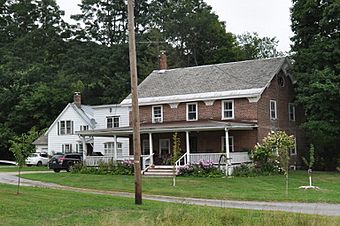Gray Rocks (Richmond, Vermont) facts for kids
Quick facts for kids |
|
|
Gray Rocks
|
|
 |
|
| Location | US 2, near jct. with I-89, Richmond, Vermont |
|---|---|
| Area | 380 acres (150 ha) |
| Built | 1813 |
| MPS | Agricultural Resources of Vermont MPS |
| NRHP reference No. | 96001534 |
| Added to NRHP | December 27, 1996 |
Gray Rocks is a really old farm in Richmond, Vermont. It's located right on United States Route 2. This farm started way back in the early 1800s. It was used for farming until 1978.
What makes Gray Rocks special is that its farm buildings are still in great shape! They show how farms changed from about 1813 to the early 1900s. Because of its history, Gray Rocks was added to the National Register of Historic Places in 1996. This means it's an important place that should be protected.
Contents
Exploring Gray Rocks Farm
Gray Rocks is a big property, covering about 380 acres (that's like 287 football fields!). It sits on both sides of United States Route 2, just east of Richmond's town center. Part of the land even goes across Interstate 89 and reaches the northern bank of the Winooski River.
What Does Gray Rocks Look Like?
Much of the land south of US 2 is open and flat. Today, it's used for pasture or growing hay. North of the road, there are also some open areas, but most of that land is covered with trees.
The main farm buildings are spread out on both sides of US 2. The farmhouse and a garage are on the north side. The big barns and other smaller buildings are on the south side.
The Historic Farmhouse
The farmhouse is a two-story building made of brick. It has a pointed roof, which is called a gable roof. The front of the house faces west and has a porch stretching all the way across it. The house was built in a style called Federal, which was popular in the early 1800s. It also has some fancy Italianate details, like decorative brackets under the roof.
A Look Back in Time: The Farm's History
This farm began around 1800. A man named James Butler first developed the property. In 1813, he sold it to Asa Rhodes, and the main house was already standing then.
For over a hundred years, the Rhodes family worked this farm. Later, in the 20th century, the Andrews family took over. They stopped farming operations in 1978. The buildings at Gray Rocks tell an interesting story. They show how farming changed over time, from growing many different crops to focusing on specific animals like sheep, and then later, dairy cows.
 | Madam C. J. Walker |
 | Janet Emerson Bashen |
 | Annie Turnbo Malone |
 | Maggie L. Walker |



